Protectorate
A protectorate is a state that is controlled and protected by another sovereign state. It is a dependent territory that has been granted local autonomy over most internal affairs while still recognizing the suzerainty of a more powerful sovereign state without being its direct possession.[1][2][3] In exchange, the protectorate usually accepts specified obligations depending on the terms of their arrangement.[3] Usually protectorates are established de jure by a treaty.[1][2] Under certain conditions as of Egypt under British rule (1882–1914) e.g., a state can also be labelled as a de facto protectorate or a "veiled protectorate".[4][5][6]
| Part of the Politics series | ||||
| Basic forms of government | ||||
|---|---|---|---|---|
.svg.png.webp) | ||||
| Power source | ||||
|
|
||||
| Power ideology | ||||
|
|
||||
| Power structure | ||||
|
|
||||
|
| ||||
A protectorate is different from a colony as they have local rulers, are not directly possessed and rarely experience colonization by the suzerain state.[7][8] However, some sources term a state that remains under the protection of another state while retaining its independence as a protected state, different from a protectorate,[9] while other sources use the terms like synonyms.[10]
History
Protectorates form one of the oldest features of international relations, dating back to the Roman Empire. Civitates foederatae were cities that were subordinate to Rome for their foreign relations. In the Middle Ages, Andorra was a protectorate of France and Spain. Modern protectorate concepts were devised in the nineteenth century.[11]
Typology
Foreign relations
In practice, a protectorate often has direct foreign relations only with and transfers the management of all its more important international affairs to the protector.[12][3][1][2] Similarly, the protectorate rarely takes military action on its own but relies on the protector for its defence. This is distinct from annexation in that the protector has no formal power to control the internal affairs of the protectorate.
Protectorates differ from League of Nations mandates and their successors, United Nations Trust Territories, whose administration is supervised, in varying degrees, by the international community. A protectorate formally enters into the protection through a bilateral agreement with the protector, while international mandates are stewarded by the world community-representing body, with or without a de facto administering power.
Protected state
A protected state has a form of protection where it continues to retain an "international personality" and enjoys an agreed amount of independence in conducting its foreign policy.[13][14] For political and pragmatic reasons, the relationship of protection is not usually advertised, but described in euphemisms such as "an independent state with special treaty relations" with the protecting state.[15] A protected state appears on world maps just as any other independent state.[lower-alpha 1]
International administration of a state can also be regarded as an internationalized form of protection, where the protector is an international organisation rather than a state.[16]
Colonial protection
Conditions regarding protection are generally much less generous for areas of colonial protection. The protectorate was often reduced to a de facto condition similar to a colony, but the pre-existing native state continuing as the agent of indirect rule. Occasionally, a protectorate was established by another form of indirect rule: a chartered company, which becomes a de facto state in its European home state (but geographically overseas), allowed to be an independent country with its own foreign policy and generally its own armed forces.
In fact, protectorates were declared despite not being duly entered into by the traditional states supposedly being protected, or only by a party of dubious authority in those states. Colonial protectors frequently decided to reshuffle several protectorates into a new, artificial unit without consulting the protectorates, a logic disrespectful of the theoretical duty of a protector to help maintain its protectorates' status and integrity. The Berlin agreement of February 26, 1885, allowed European colonial powers to establish protectorates in Black Africa (the last region to be divided among them) by diplomatic notification, even without actual possession on the ground. This aspect of history is referred to as the Scramble for Africa. A similar case is the formal use of such terms as colony and protectorate for an amalgamation, convenient only for the colonizer or protector, of adjacent territories, over which it held (de facto) sway by protective or "raw" colonial logic.
Amical protection
In amical protection as of United States of the Ionian Islands under British, the terms are often very favourable for the protectorate.[17][18] The political interest of the protector is frequently moral (a matter of accepted moral obligation, prestige, ideology, internal popularity, or dynastic, historical, or ethnocultural ties). Or the protector's interest is in countering a rival or enemy power (e.g., preventing the rival from obtaining or maintaining control of areas of strategic importance). This may involve a very weak protectorate surrendering control of its external relations; this, however, may not constitute any real sacrifice, as the protectorate may not have been able to have a similar use of them without the protector's strength.
Amical protection was frequently extended by the great powers to other Christian (generally European) states and to smaller states that had no significant importance. In the post-1815 period, non-Christian states (such as China's Qing dynasty) also provided amical protection towards other much weaker states.
In modern times, a form of amical protection can be seen as an important or defining feature of microstates. According to the definition proposed by Dumienski (2014): "microstates are modern protected states, i.e. sovereign states that have been able to unilaterally depute certain attributes of sovereignty to larger powers in exchange for benign protection of their political and economic viability against their geographic or demographic constraints".[19]
Argentine protectorates
- Equatorial Guinea
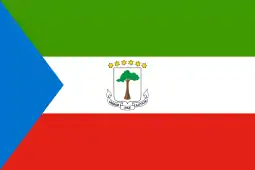 (1810-1815)[20]
(1810-1815)[20] - Peru
.svg.png.webp) (1820–1822)
(1820–1822) - Gobierno del Cerrito
.svg.png.webp) (1843–1851)
(1843–1851) - Paraguay
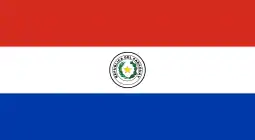 (1876)
(1876)
De facto protectorates
- Republic of Tucumán
 (1820-1821)
(1820-1821) - National Territory of the Gran Chaco
 (1874-1884)
(1874-1884) - National Territory of the Tierra del Fuego, Antarctica and South Atlantic Islands
 (1884-1991)
(1884-1991)
British protectorates and protected states
Americas
.svg.png.webp) Barbados (1627–1652) (as a proprietary colony under William Courteen, followed by James Hay I)
Barbados (1627–1652) (as a proprietary colony under William Courteen, followed by James Hay I) Mosquito Coast (1655–1860) (over Central America's Miskito Indian nation)
Mosquito Coast (1655–1860) (over Central America's Miskito Indian nation)
Arab world
 Aden Protectorate (1872–1963); precursor state of South Yemen[21]
Aden Protectorate (1872–1963); precursor state of South Yemen[21]
- Eastern Protectorate States (mostly in Haudhramaut); later the Protectorate of South Arabia (1963–1967)
- Western Protectorate States; later the Federation of South Arabia (1959/1962-1967), including Aden Colony
 Wahidi Sultanates (these included: Balhaf, Azzan, Bir Ali, and Habban)
Wahidi Sultanates (these included: Balhaf, Azzan, Bir Ali, and Habban) Beihan
Beihan Dhala and Qutaibi
Dhala and Qutaibi Fadhli
Fadhli Lahej
Lahej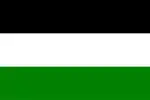 Lower Yafa
Lower Yafa Audhali
Audhali Haushabi
Haushabi Upper Aulaqi Sheikhdom
Upper Aulaqi Sheikhdom Upper Aulaqi Sultanate
Upper Aulaqi Sultanate Lower Aulaqi
Lower Aulaqi Alawi
Alawi Aqrabi
Aqrabi Dathina
Dathina Shaib
Shaib
.svg.png.webp) Sultanate of Egypt (1914–1922)
Sultanate of Egypt (1914–1922)
.svg.png.webp) Anglo-Egyptian Sudan (1899–1956) (condominium with Egypt)
Anglo-Egyptian Sudan (1899–1956) (condominium with Egypt).svg.png.webp) British Somaliland (1884–1960)[21]
British Somaliland (1884–1960)[21].svg.png.webp) Kingdom of Egypt (1922–1936)[22]
Kingdom of Egypt (1922–1936)[22] British Residency of the Persian Gulf (1822–1971); headquarters based at Bushire, Persia
British Residency of the Persian Gulf (1822–1971); headquarters based at Bushire, Persia
.svg.png.webp) Bahrain, protected state (1880–1971)[15]
Bahrain, protected state (1880–1971)[15] Sheikhdom of Kuwait, protected state (1899–1961)[15]
Sheikhdom of Kuwait, protected state (1899–1961)[15].svg.png.webp) Qatar (1916–1971)
Qatar (1916–1971).svg.png.webp) Trucial States; precursor state of the UAE, protected states (1892–1971)[15]
Trucial States; precursor state of the UAE, protected states (1892–1971)[15]
 Abu Dhabi (1820–1971)
Abu Dhabi (1820–1971)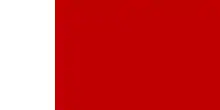 Ajman (1820–1971)
Ajman (1820–1971)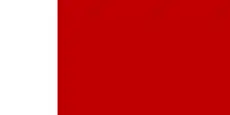 Dubai (1835–1971)
Dubai (1835–1971).svg.png.webp) Fujairah (1952–1971)
Fujairah (1952–1971) Ras Al Khaimah (1820–1971)
Ras Al Khaimah (1820–1971) Sharjah (1820–1971)
Sharjah (1820–1971)
 Kalba (1936–1951)
Kalba (1936–1951)
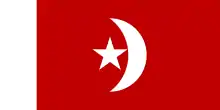 Umm al-Qaiwain (1820–1971)
Umm al-Qaiwain (1820–1971)
 Muscat and Oman (1892–1977) (informal, protected state)[23][24]
Muscat and Oman (1892–1977) (informal, protected state)[23][24]
South Asia
.svg.png.webp) Cis-Sutlej states[25][26] (1809–1862)
Cis-Sutlej states[25][26] (1809–1862) Maldive Islands (1887–1965)[27]
Maldive Islands (1887–1965)[27] Kingdom of Sikkim (1861–1947)[28]
Kingdom of Sikkim (1861–1947)[28].svg.png.webp) Bhutan, protected state (1910–1947)[15]
Bhutan, protected state (1910–1947)[15]
Rest of Asia
.svg.png.webp) British North Borneo (1888–1946)
British North Borneo (1888–1946) Brunei (1888–1984)
Brunei (1888–1984).svg.png.webp) Emirate of Afghanistan, protected state (1879–1919)[15]
Emirate of Afghanistan, protected state (1879–1919)[15]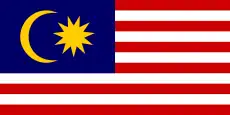 Federation of Malaya (1948–1957)
Federation of Malaya (1948–1957)
.svg.png.webp) Federated Malay States (1895–1946)
Federated Malay States (1895–1946)
 Negeri Sembilan (1888–1895)
Negeri Sembilan (1888–1895)
 Sungai Ujong (1874–1888)
Sungai Ujong (1874–1888) Jelebu (1886–1895)1946)
Jelebu (1886–1895)1946).svg.png.webp) Johor Muar (1897–1909)
Johor Muar (1897–1909)
 Kedah (1909–1946)
Kedah (1909–1946)
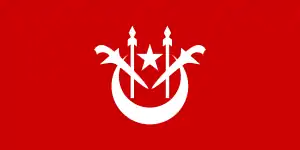 Kelantan (1909–1946)
Kelantan (1909–1946)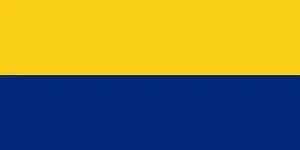 Perlis (1909–1946)
Perlis (1909–1946)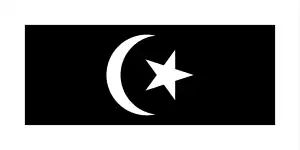 Terengganu (1909–1946)
Terengganu (1909–1946)
.svg.png.webp) Raj of Sarawak (1888–1946)
Raj of Sarawak (1888–1946)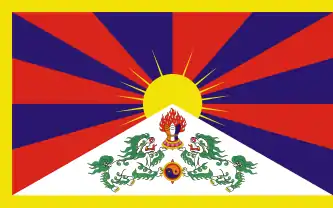 Kingdom of Tibet
Kingdom of Tibet
Europe
.svg.png.webp) British Cyprus (1871–1914) (put under British military administration 1914–22 then proclaimed a Crown Colony 1922–60)
British Cyprus (1871–1914) (put under British military administration 1914–22 then proclaimed a Crown Colony 1922–60)
.svg.png.webp) Malta Protectorate (1800–1813);
Malta Protectorate (1800–1813);  Crown Colony of Malta proclaimed in 1813) (de jure part of the Kingdom of Sicily but under British protection)
Crown Colony of Malta proclaimed in 1813) (de jure part of the Kingdom of Sicily but under British protection)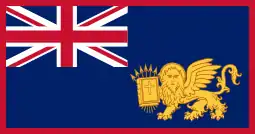 Ionian islands (1815-1864) (a Greek state and amical protectorate of Great Britain between 1815 and 1864)
Ionian islands (1815-1864) (a Greek state and amical protectorate of Great Britain between 1815 and 1864)
Sub-Saharan Africa
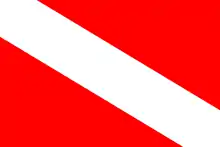 Barotseland Protectorate (1900–1964)
Barotseland Protectorate (1900–1964) Bechuanaland Protectorate (1885–1966)
Bechuanaland Protectorate (1885–1966).svg.png.webp) East Africa Protectorate (1895–1920)
East Africa Protectorate (1895–1920).svg.png.webp) Gambia Colony and Protectorate* (1894–1965)
Gambia Colony and Protectorate* (1894–1965).svg.png.webp) Kenya Protectorate* (1920–1963)
Kenya Protectorate* (1920–1963).svg.png.webp) Northern Nigeria Protectorate* (1900–1914)
Northern Nigeria Protectorate* (1900–1914).svg.png.webp) Northern Rhodesia (1924–1964)
Northern Rhodesia (1924–1964).svg.png.webp) Gold Coast (British colony) (1902–1957)
Gold Coast (British colony) (1902–1957).svg.png.webp) Nyasaland Protectorate (1893–1964) (
Nyasaland Protectorate (1893–1964) ( British Central Africa Protectorate until 1907)
British Central Africa Protectorate until 1907).gif) Sierra Leone Protectorate* (1896–1961)
Sierra Leone Protectorate* (1896–1961).svg.png.webp) Southern Nigeria Protectorate (1900–1914)
Southern Nigeria Protectorate (1900–1914) Swaziland (1902–1968)
Swaziland (1902–1968)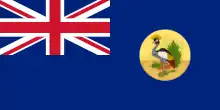 Uganda Protectorate (1894–1962)
Uganda Protectorate (1894–1962).svg.png.webp) Sultanate of Zanzibar (1890–1963)
Sultanate of Zanzibar (1890–1963)
*protectorates which existed alongside a colony of the same name
.svg.png.webp) Kingdom of Egypt (1922–1936)[22]
Kingdom of Egypt (1922–1936)[22]
Oceania
 Territory of Papua (1884–1888)
Territory of Papua (1884–1888).svg.png.webp) British Solomon Islands (1893–1978)
British Solomon Islands (1893–1978) Cook Islands (1888–1901)
Cook Islands (1888–1901).svg.png.webp) Gilbert and Ellice Islands (1892–1916)
Gilbert and Ellice Islands (1892–1916) Niue (1900–1901)
Niue (1900–1901) Tokelau (1877–1916)
Tokelau (1877–1916)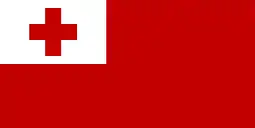 Tonga (1900–1970)
Tonga (1900–1970)
Chinese protectorates
Dutch protectorates
- Various sultanates in the Dutch East Indies (present Indonesia)
- Trumon Sultanate (1770?), Langkat Sultanate (26 October 1869), Deli Sultanate (22 August 1862), Asahan Sultanate (27 September 1865), Siak Sultanate (1 February 1858) and Indragiri Sultanate (1838?) in Sumatra
- Jogjakarta Sultanate (13 February 1755), Mataram Empire and Surakarta Sunanate (26 February 1677), Duchy of Mangkunegara (24 February 1757) and Duchy of Paku Alaman (22 June 1812) in Java.
- Sumbawa Sultanate (?) and Bima Sultanate (8 December 1669) in Lesser Sunda Islands.
- Pontianak Sultanate (16 August 1819), Sambas Sultanate (1819), Kubu Sultanate (4 June 1823), Landak Sultanate (?), Mempawah Sultanate (?), Matan Sultanate (?), Sanggau Sultanate (?), Sekadau Sultanate (?), Simpang Sultanate (?), Sintang Sultanate (1822), Sukadana Sultanate (?), Kota Waringin Sultanate (?), Kutai Kertanegara Sultanate (8 August 1825), Gunung Tabur Sultanate (?) and Bulungan Sultanate (?) in Borneo.
- Gowa Sultanate (1669), Bone Sultanate (?), Sidenreng Sultanate (?), Soppeng Sultanate (?), Butung Sultanate (?), Muna Sultanate (?) and Banggai Sultanate (?) in Celebes.
- Ternate (12 October 1676) and Batjan Sultanate (?) in The Moluccas.
- Kaimana Sultanate (?) in Dutch New Guinea.
French protectorates
Arab world and Madagascar
- Comoros 21 April 1886 French protectorate (Anjouan) until 25 July 1912 when annexed.
- Present Djibouti was originally, since 24 June 1884, the Territory of Obock and Protectorate of Tadjoura (Territoires Français d'Obock, Tadjoura, Dankils et Somalis), a French protectorate recognized by Britain on 9 February 1888, renamed on 20 May 1896 as French Somaliland (Côte Française des Somalis).
- Mauritania on 12 May 1903 French protectorate; within Mauritanian several traditional states:
- Adrar emirate since 9 January 1909 French protectorate (before Spanish)
- The Taganit confederation's emirate (founded by Idaw `Ish dynasty), since 1905 under French protectorate.
- Brakna confederation's emirate
- Emirate of Trarza: 15 December 1902 placed under French protectorate status.
- Morocco
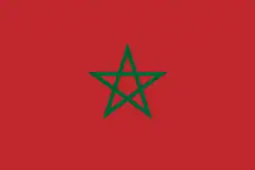 – most of the sultanate was under French protectorate (30 March 1912 – 7 April 1956) although, in theory, it remained a sovereign state under the Treaty of Fez;[30] this fact was confirmed by the International Court of Justice in 1952.[31]
– most of the sultanate was under French protectorate (30 March 1912 – 7 April 1956) although, in theory, it remained a sovereign state under the Treaty of Fez;[30] this fact was confirmed by the International Court of Justice in 1952.[31]
- The northern part of Morocco was under Spanish protectorate in the same period.
- Traditional Madagascar States
- Kingdom of Imerina
 under French protectorate, 6 August 1896. French Madagascar colony, 28 February 1897.
under French protectorate, 6 August 1896. French Madagascar colony, 28 February 1897.
- Kingdom of Imerina
- Tunisia
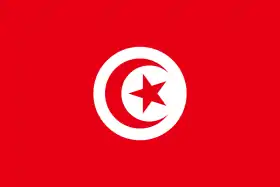 (12 May 1881 – 20 March 1956): became a French protectorate by treaty
(12 May 1881 – 20 March 1956): became a French protectorate by treaty
Asia
- French Indochina until 1953/54:
Europe
- Rhenish Republic
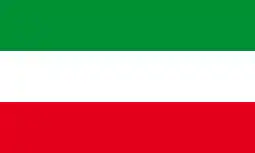 (1923-1924)
(1923-1924) - Saar Protectorate
.svg.png.webp) (1947–1956), not colonial or amical, but a former part of Germany that would by referendum return to it, in fact a re-edition of a former League of Nations mandate. Most French protectorates were colonial.
(1947–1956), not colonial or amical, but a former part of Germany that would by referendum return to it, in fact a re-edition of a former League of Nations mandate. Most French protectorates were colonial.
Sub-Saharan Africa
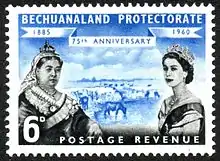
The legal regime of "protection" was the formal legal structure under which French colonial forces expanded in Africa between the 1830s and 1900. Almost every pre-existing state in the area later covered by French West Africa was placed under protectorate status at some point, although direct rule gradually replaced protectorate agreements. Formal ruling structures, or fictive recreations of them, were largely retained as the lowest level authority figure in the French Cercles, with leaders appointed and removed by French officials.[32]
- Benin traditional states
- Independent of Danhome
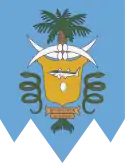 , under French protectorate, from 1889
, under French protectorate, from 1889 - Porto-Novo a French protectorate, 23 February 1863 – 2 January 1865. Cotonou a French Protectorate, 19 May 1868. Porto-Novo French protectorate, 14 April 1882.
- Independent of Danhome
- Central African Republic traditional states:
- French protectorate over Dar al-Kuti (1912 Sultanate suppressed by the French), 12 December 1897
- French protectorate over the Sultanate of Bangassou, 1894
- Burkina Faso was since 20 February 1895 a French protectorate named Upper Volta (Haute-Volta)
- Chad: Baghirmi state 20 September 1897 a French protectorate
- Côte d'Ivoire: 10 January 1889 French protectorate of Ivory Coast
- Guinea: 5 August 1849 French protectorate over coastal region; (Riviéres du Sud).
- Niger, Sultanate of Damagaram (Zinder), 30 July 1899 under French protectorate over the native rulers, titled Sarkin Damagaram or Sultan
- Senegal: 4 February 1850 First of several French protectorate treaties with local rulers
Oceania
- French Polynesia
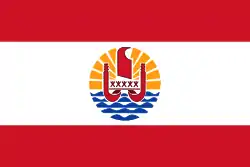 , mainly the Society Islands (several others were immediately annexed).[33] All eventually were annexed by 1889.
, mainly the Society Islands (several others were immediately annexed).[33] All eventually were annexed by 1889.
- Otaheiti (native king styled Ari`i rahi) becomes a French protectorate known as Tahiti, 1842–1880
- Raiatea and Tahaa (after temporary annexation by Otaheiti; (title Ari`i) a French protectorate, 1880)
- Mangareva (one of the Gambier Islands; ruler title `Akariki) a French protectorate, 16 February 1844 (unratified) and 30 November 1871[34]
- Wallis and Futuna:
German protectorates
The German Empire used the word Schutzgebiet, literally protectorate, for all of its colonial possessions until they were lost during World War I, regardless of the actual level of government control. Cases involving indirect rule included:
- German New Guinea
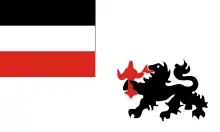
- Marshall Islands

- Nauru
 , various officials posted with the Head Chiefs
, various officials posted with the Head Chiefs - North Solomon Islands
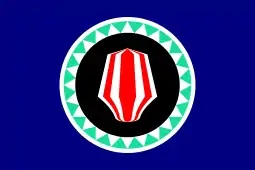
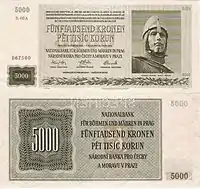 Banknotes of the Protectorate of Bohemia and Moravia, 1939–1945
Banknotes of the Protectorate of Bohemia and Moravia, 1939–1945 - Samoa, formerly Western Samoa
- Sultanate of Witu, called Wituland
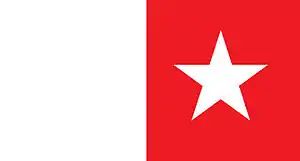 , in present-day Kenya
, in present-day Kenya - German South-West Africa (later Namibia)
- Togoland
- Rwanda, a Resident with the native Mwami (king)
- Urundi, a Resident with the native Mwami (king; 1908 Sultan)
Before and during World War II, Nazi Germany designated the rump of occupied Czechoslovakia and Denmark as protectorates:
- Protectorate of Bohemia and Moravia
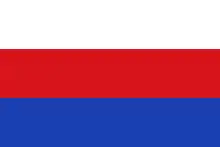 , 1939–1945
, 1939–1945 - Denmark
 , 1940–1943
, 1940–1943
Italian protectorates
In Europe:
- The Albanian Republic
 (1917–1920) and the Albanian Kingdom
(1917–1920) and the Albanian Kingdom .svg.png.webp) (1939–1940)
(1939–1940) - Independent State of Croatia
 (1941–1943)
(1941–1943) - Monaco
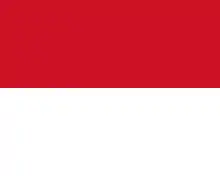 under amical Protectorate of the Kingdom of Sardinia 20 November 1815 to 1860.
under amical Protectorate of the Kingdom of Sardinia 20 November 1815 to 1860.
In the colonial empire:
- Ethiopia
 : 2 May 1889 Treaty of Wuchale, in the Italian language version, stated that Ethiopia was to become an Italian protectorate, while the Ethiopian Amharic language version merely stated that the Emperor could, if he so chose, go through Italy to conduct foreign affairs. When the differences in the versions came to light, Emperor Menelik II abrogated first the article in question (XVII), and later the whole treaty. The event culminated in the First Italo-Ethiopian War, in which Ethiopia was victorious and defended her sovereignty in 1896.
: 2 May 1889 Treaty of Wuchale, in the Italian language version, stated that Ethiopia was to become an Italian protectorate, while the Ethiopian Amharic language version merely stated that the Emperor could, if he so chose, go through Italy to conduct foreign affairs. When the differences in the versions came to light, Emperor Menelik II abrogated first the article in question (XVII), and later the whole treaty. The event culminated in the First Italo-Ethiopian War, in which Ethiopia was victorious and defended her sovereignty in 1896. - Libya: on 15 October 1912 Italian protectorate declared over Cirenaica (Cyrenaica) until 17 May 1919.
- Somalia: 3 August 1889 Benadir Coast Italian protectorate (in the northeast; unoccupied until May 1893), until 16 March 1905 when it changed to Italian Somaliland.
- Majeerteen Sultanate
 since 7 April 1889 under Italian protectorate (renewed 7 April 1895), then in 1927 incorporated into the Italian colony.
since 7 April 1889 under Italian protectorate (renewed 7 April 1895), then in 1927 incorporated into the Italian colony. - Sultanate of Hobyo
 since December 1888 under Italian protectorate (renewed 11 April 1895), then in October 1925 incorporated into the Italian colony (known as Obbia).
since December 1888 under Italian protectorate (renewed 11 April 1895), then in October 1925 incorporated into the Italian colony (known as Obbia).
- Majeerteen Sultanate
Japanese protectorates
- Korean Empire (1905–1910)
.svg.png.webp)
- Empire of Manchuria (1932~1945)
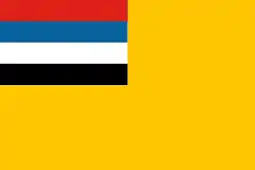
- Philippines (1942~1945)

Polish protectorates
- Kaffa (1462–1475)
Portuguese protectorates
- Kingdom of Kongo (1390–1914)
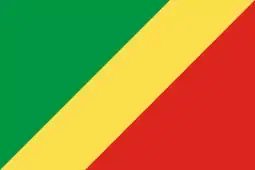
- Cabinda (Portuguese Congo) (1885–1974)—Portugal first claimed sovereignty over Cabinda in the February 1885 Treaty of Simulambuco, which gave Cabinda the status of a protectorate of the Portuguese Crown under the request of "the princes and governors of Cabinda".
- Gaza Empire (1824–1895)
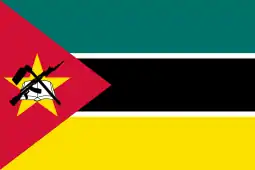
- Angoche Sultanate (1903–1910)
Russian protectorates
- Kingdom of Kartli-Kakheti (1783–1801)

- Kingdom of Imereti (1804–1810)

- Revolutionary Serbia (1807–12)

- Principality of Serbia (1826–56)

- Principality of Moldavia (1829–56)
.svg.png.webp)
- Principality of Wallachia (1829–56)

- Emirate of Bukhara (1873–1920)

- Khanate of Khiva (1873–1920)

- Uryankhay Krai (1914)
.svg.png.webp)
- Second East Turkestan Republic (1944-1949)
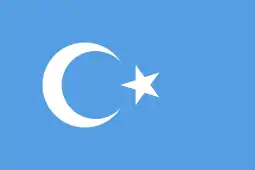
De facto protectorates
Some sources mention following states as de facto Russian protectorates:[35][36][37][38]
- South Ossetia (1990-)
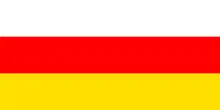
- Transnistria (1992-)
.svg.png.webp)
- Abkhazia (1994-)
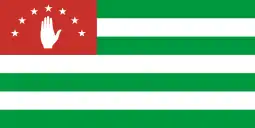
- Luhansk People's Republic (2015-)

- Donetsk People's Republic (2015-)
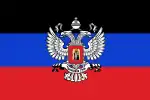
Spanish protectorates
- Spanish Morocco
 protectorate from 27 November 1912 until 2 April 1958 (Northern zone until 7 April 1956, Southern zone (Cape Juby) until 2 April 1958).
protectorate from 27 November 1912 until 2 April 1958 (Northern zone until 7 April 1956, Southern zone (Cape Juby) until 2 April 1958).
Turkish protectorates
- Aceh Sultanate (1569–1903)
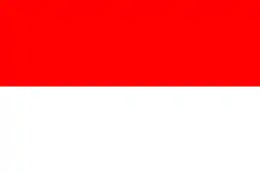
- Maldives (1560–1590)
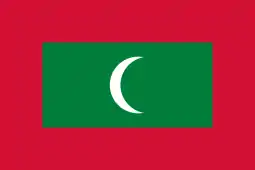
- Cossack Hetmanate (1669 – 1685)

De facto protectorate
- Northern Cyprus (1983 – )
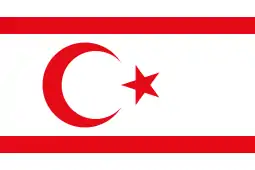
United States protectorates
- Liberia
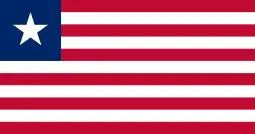 (1822–1847)[39][40]
(1822–1847)[39][40] - Cuba
.svg.png.webp) (1898–1934)[41][42][43]
(1898–1934)[41][42][43] - Panama Canal Zone
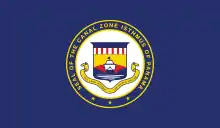 (1903–1979)[44]
(1903–1979)[44] - Philippines
.svg.png.webp) (1935–1946):[45] Under the provisions of the Tydings–McDuffie Act, the territory would become self-governing although its military and foreign affairs would be under the United States.
(1935–1946):[45] Under the provisions of the Tydings–McDuffie Act, the territory would become self-governing although its military and foreign affairs would be under the United States.
Contemporary usage by the United States
Some agencies of the United States government, such as the United States Environmental Protection Agency, still use the term protectorate to refer to insular areas of the United States such as Guam, the Northern Mariana Islands, Puerto Rico and the U.S. Virgin Islands.[46] This was also the case with the Philippines and (it can be argued via the Platt Amendment) Cuba at the end of Spanish colonial rule.[41] Liberia was the only African nation that was a colony for the United States but the government had no control over the land as it was controlled by the privately owned American Colonization Society. It was, however, a protectorate from January 7, 1822 until the Liberian Declaration of Independence from the American Colonization Society on July 26, 1847. Liberia was founded and established as a homeland for freed African-Americans and ex-Caribbean slaves who left the United States and the Caribbean islands with help and support from the American Colonization Society.[39][40] However, the agency responsible for the administration of those areas, the Office of Insular Affairs (OIA) within the United States Department of Interior, uses only the term "insular area" rather than protectorate.
United Nations protectorates
Joint protectorates
- The Adriatic Republic of Ragusa
 (present-day Dubrovnik in Croatian Dalmatia) was a joint Habsburg Austrian–Ottoman Turkish protectorate from 20 August 1684 to 24 August 1798 (exceptionally both a Catholic and a Muslim protector).
(present-day Dubrovnik in Croatian Dalmatia) was a joint Habsburg Austrian–Ottoman Turkish protectorate from 20 August 1684 to 24 August 1798 (exceptionally both a Catholic and a Muslim protector). - The United States of the Ionian Islands
 and the Septinsular Republic
and the Septinsular Republic 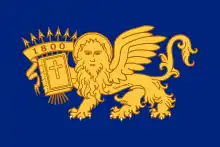 were federal republics of seven formerly Venetian (see Provveditore) Ionian islands (Corfu, Cephalonia, Zante, Santa Maura, Ithaca, Cerigo, and Paxos), officially under joint protectorate of the Allied Christian Powers, de facto a British amical protectorate from 1815 to 1864.
were federal republics of seven formerly Venetian (see Provveditore) Ionian islands (Corfu, Cephalonia, Zante, Santa Maura, Ithaca, Cerigo, and Paxos), officially under joint protectorate of the Allied Christian Powers, de facto a British amical protectorate from 1815 to 1864.
See also
Notes
- Protected state in this technical sense is distinguished from the informal usage of "protected state" used for distinguishing the receiving state of protection from the protecting state.
References
- Fuess, Albrecht (1 January 2005). "Was Cyprus a Mamluk protectorate? Mamluk policies toward Cyprus between 1426 and 1517". Journal of Cyprus Studies. 11 (28–29): 11–29. ISSN 1303-2925. Retrieved 24 October 2020.
- Reisman, W. (1 January 1989). "Reflections on State Responsibility for Violations of Explicit Protectorate, Mandate, and Trusteeship Obligations". Michigan Journal of International Law. 10 (1): 231–240. ISSN 1052-2867. Retrieved 24 October 2020.
- Bojkov, Victor D. "Democracy in Bosnia and Herzegovina: Post-1995 political system and its functioning" (PDF). Southeast European Politics 4.1: 41–67.
- Leys, Colin (2014). "The British ruling class". Socialist Register. 50. ISSN 0081-0606. Retrieved 23 October 2020.
- Kirkwood, Patrick M. (21 July 2016). ""Lord Cromer's Shadow": Political Anglo-Saxonism and the Egyptian Protectorate as a Model in the American Philippines". Journal of World History. 27 (1): 1–26. doi:10.1353/jwh.2016.0085. ISSN 1527-8050. S2CID 148316956. Retrieved 23 October 2020.
- Rubenson, Sven (1966). "Professor Giglio, Antonelli and Article XVII of the Treaty of Wichale". The Journal of African History. 7 (3): 445–457. doi:10.1017/S0021853700006526. ISSN 0021-8537. JSTOR 180113. Retrieved 24 October 2020.
- Archer, Francis Bisset (1967). The Gambia Colony and Protectorate: An Official Handbook. Psychology Press. ISBN 978-0-7146-1139-6.
- Johnston, Alex. (1905). "The Colonization of British East Africa". Journal of the Royal African Society. 5 (17): 28–37. ISSN 0368-4016. JSTOR 715150. Retrieved 24 October 2020.
- Hoffmann, GERHARD (1 January 1987). "PROTECTORATES". Encyclopedia of Disputes Installment 10. Elsevier: 336–339. doi:10.1016/B978-0-444-86241-9.50085-3. ISBN 9780444862419. Retrieved 24 October 2020.
- Reisman, W. Michael (1989). "Reflections on State Responsibility for Violations of Explicit Protectorate, Mandate, and Trusteeship Obligations". Michigan Journal of International Law. 10: 231.
- Willigen, Peacebuilding and International Administration (2013), p. 16.
- Yoon, Jong-pil (17 August 2020). "Establishing expansion as a legal right: an analysis of French colonial discourse surrounding protectorate treaties". History of European Ideas. 46 (6): 811–826. doi:10.1080/01916599.2020.1722725. ISSN 0191-6599. S2CID 214425740. Retrieved 24 October 2020.
- Meijknecht, Towards International Personality (2001), p. 42.
- Willigen, Peacebuilding and International Administration (2013), p. 16: "First, protected states are entities which still have substantial authority in their internal affairs, retain some control over their foreign policy, and establish their relation to the protecting state on a treaty or another legal instrument. Protected states still have qualifications of statehood."
- Onley, The Raj Reconsidered (2009), p. 50.
- Willigen, Peacebuilding and International Administration (2013), pp. 16–17.
- Wick, Alexis (2016), The Red Sea: In Search of Lost Space, Univ of California Press, pp. 133–, ISBN 978-0-520-28592-7
- Αλιβιζάτου, Αικατερίνη (12 March 2019). "Use of GIS in analyzing archaeological sites: the case study of Mycenaean Cephalonia, Greece". Retrieved 24 October 2020. Cite journal requires
|journal=(help) - Dumieński, Zbigniew (2014). "Microstates as Modern Protected States: Towards a New Definition of Micro-Statehood" (PDF). Occasional Paper. Centre for Small State Studies. Archived from the original (PDF) on 14 July 2014. Cite journal requires
|journal=(help) - History of Equatorial Guinea
- Onley, The Raj Reconsidered (2009), p. 51.
- "Histories of the Modern Middle East". Laits.utexas.edu. Retrieved 21 April 2019.
- Francis Carey Owtram (1999). "Oman and the West: State Formation in Oman since 1920" (PDF). University of London. Retrieved 31 October 2020.
- Onley, The Raj Reconsidered (2009), pp. 50–51.
- Cunningham, Joseph Davy (1849). A History of the Sikhs: From the Origin of the Nation to the Battles of the Sutlej. John Murray.
- Meyer, William Stevenson (1908). "Ferozepur district". The Imperial Gazetteer of India. XII. p. 90.
But the British Government, established at Delhi since 1803, interevened with an offer of protection to all the CIS-SUTLEJ STATES; and Dhanna Singh gladly availed himself of the promised aid, being one of the first chieftains to accept British protection and control.
- "Timeline – Story of Independence". Archived from the original on 2019-07-27. Retrieved 2020-05-11.
- Mullard, Saul (2011), Opening the Hidden Land: State Formation and the Construction of Sikkimese History, BRILL, p. 184, ISBN 978-90-04-20895-7
- "A History of Korea: From Antiquity to the Present, by Michael J. Seth", p112
- Bedjaoui, Mohammed (1 January 1991). International Law: Achievements and Prospects. Martinus Nijhoff Publishers. ISBN 9231027166 – via Google Books.
- Capaldo, Giuliana Ziccardi (1 January 1995). Repertory of Decisions of the International Court of Justice (1947–1992). Martinus Nijhoff Publishers. ISBN 0792329937 – via Google Books.
- See the classic account on this in Robert Delavignette. Freedom and Authority in French West Africa. London: Oxford University Press, (1950). The more recent statndard studies on French expansion include:
Robert Aldrich. Greater France: A History of French Overseas Expansion. Palgrave MacMillan (1996) ISBN 0-312-16000-3.
Alice L. Conklin. A Mission to Civilize: The Republican Idea of Empire in France and West Africa 1895–1930. Stanford: Stanford University Press (1998), ISBN 978-0-8047-2999-4.
Patrick Manning. Francophone Sub-Saharan Africa, 1880–1995. Cambridge University Press (1998) ISBN 0-521-64255-8.
Jean Suret-Canale. Afrique Noire: l'Ere Coloniale (Editions Sociales, Paris, 1971); Eng. translation, French Colonialism in Tropical Africa, 1900 1945. (New York, 1971). - C. W. Newbury. Aspects of French Policy in the Pacific, 1853–1906. The Pacific Historical Review, Vol. 27, No. 1 (Feb., 1958), pp. 45–56
- Gonschor, Lorenz Rudolf (August 2008). Law as a Tool of Oppression and Liberation: Institutional Histories and Perspectives on Political Independence in Hawaiʻi, Tahiti Nui/French Polynesia and Rapa Nui. Honolulu: University of Hawaii at Manoa. pp. 56–59. hdl:10125/20375.
- Gerrits, Andre W. M.; Bader, Max (2 July 2016). "Russian patronage over Abkhazia and South Ossetia: implications for conflict resolution". East European Politics. 32 (3): 297–313. doi:10.1080/21599165.2016.1166104. ISSN 2159-9165. S2CID 156061334.
- Greene, Sam (26 April 2019). "Putin's 'Passportization' Move Aimed At Keeping the Donbass Conflict on Moscow's Terms". The Moscow Times. Retrieved 24 October 2020.
- Robinson, Paul (1 October 2016). "Russia's role in the war in Donbass, and the threat to European security". European Politics and Society. 17 (4): 506–521. doi:10.1080/23745118.2016.1154229. ISSN 2374-5118. S2CID 155529950.
- Pieńkowski, Jakub (2016). "Renewal of Negotiations on Resolving the Transnistria Conflict". Cite journal requires
|journal=(help) - "The World: Two Decades of Decline; When Liberians Looked to America in Vain". The New York Times. 13 July 2003.
- "A case of double conciousness americo-liberians and indigenous liberian relations 1840-1930 liberian relations 1840-1930". University of Central Florida. 2012.
- "Platt Amendment (1903)".
- Gould, Lewis L. "William McKinley: Foreign Affairs". Miller Center.
- "U.S. De Facto Protectorate of Cuba, 1898-1934". dwkcommentaries.
- Nelson, Karen Cherese. "The U.S. Protectorate in Panama: An Analysis of Recent U.S.-Panamanian Relations". Southern Illinois University Carbondale.
- "The Philippines, 1898–1946". History.house.gov.
- "Notice of Finding of Failure To Submit State Plans for the Municipal Solid Waste Landfills Emission Guidelines". Environmental Protection Agency. 12 March 2020.
- "From the Archive 1999: Timor the defiant". The Sydney Morning Herald. 30 August 2019.
- "East Timor". Human Rights Watch.
Bibliography
- Onley, James (March 2009), "The Raj Reconsidered: British India's Informal Empire and Spheres of Influence in Asia and Africa" (PDF), Asian Affairs, 11 (1)
- Meijknecht, Anna (2001), Towards International Personality: The Position of Minorities and Indigenous Peoples in International Law, Intersentia NV, ISBN 978-90-5095-166-1
- Willigen, Niels van (2013), Peacebuilding and International Administration: The Cases of Bosnia and Herzegovina and Kosovo, Routledge, ISBN 978-1-134-11718-5
French
- Larousse, Pierre; Paul Augé; Claude Augé (1925). Nouveau Petit Larousse Illustré: Dictionnaire Encyclopédique. Larousse.